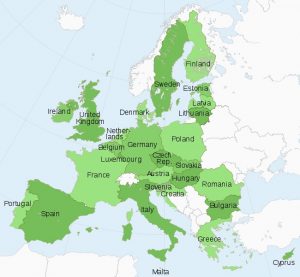by Bill O’Grady | PDF
(N.B. Due to the Independence Day holiday, the next report will be published on July 13.)
A global hegemon provides two broad categories of public goods. The first is security. A successful hegemon enforces some degree of global security as it has the ability to project power globally. This power projection ostensibly prevents regional wars from becoming world wars. Another way of thinking about hegemony is that if a world war occurs, it is evidence of hegemonic failure. In addition to war suppression, the hegemon’s global reach gives it the capability to secure sea lanes, which facilitates global trade.
The second public good is financial. The hegemon provides the reserve currency which enables global trade and investment. The reserve currency nation must have two characteristics to be a successful provider of the reserve currency. First, it must be willing to run persistent current account deficits. It is through trade that the rest of the world acquires the reserve currency. Persistent current account deficits put great strain on the labor markets of the hegemon and require a strong commitment from the reserve currency nation to absorb these imports. Second, it must have deep financial markets and an instrument that is considered safe and widely available so nations that accumulate the reserve currency can use this instrument to hold this saving until it is needed for trade or direct investment.
If the U.S. is going to be replaced as a hegemon, the successor will need to fill these two roles. Currently, there is no nation that is capable or willing to fully provide these public goods. However, it is not impossible to consider a situation where a partial replacement occurs. Such outcomes have occurred before. By the late 1800s, Britain realized that it could not defend any of its colonies in the Western Hemisphere from a determined American attack. The U.S. economy was too well developed and its navy and army too large; the costs of defending Canada, for example, would have been excessive. So, quietly, the British ceded regional hegemony, at least in terms of security, to the U.S. That allowed Westminster to focus on the other growing threat, Germany. In the current environment, the U.S. could cede a sphere of influence to China. It is arguable that the U.S. would like to see a regional hegemon arise in the Middle East to allow America to reduce its security burden there as well.
Something similar could occur on the reserve currency front as well. Some economists, notably Barry Eichengreen, have argued that there is the potential for multiple reserve currencies. Although we have had doubts about this possibility, recent developments have led us to consider the possibility that the euro could become a serious competitor for the dollar as a reserve asset. That doesn’t mean the euro would replace the dollar as the reserve currency, but it would mean the euro could be a parallel reserve currency and offer competition to the dollar.
The most recent development that could create potential competition for the dollar’s reserve status is the proposed new financial instrument designed to fund Europe’s recovery from the pandemic. The proposal evolved from a plan developed by Germany and France to create a €500 billion recovery fund. European Commission President Ursula von der Leyen expanded the proposal, increasing it to €750 billion. But the key element of the proposal is a specific bond backed by the full faith and credit of the European Union. The bond service would be tied to several EU-wide revenue sources, including a proposed digital tax, a carbon border tax and fees on transportation.
The proposed plan still requires approval by all members of the EU. The “frugal four”—Austria, Denmark, the Netherlands and Sweden—could still scuttle the proposal. But, Germany’s support is a reversal of its longstanding opposition to EU debt mutualization and will probably be enough to sway the opposition toward accepting the program.
The prospect of debt mutualization creates competition for the dollar’s reserve status. The EU doesn’t fulfill the other requirements for hegemony; its military strength has atrophied, and it has not shown a willingness to run persistent current account deficits. Nevertheless, a mutualized debt instrument does make the euro a much more attractive currency for reserve purposes.
In this report, we will examine why an alternative reserve currency might be attractive for several countries. An analysis of why Germany has changed its position on debt mutualization will follow. As always, we will conclude with market ramifications.



